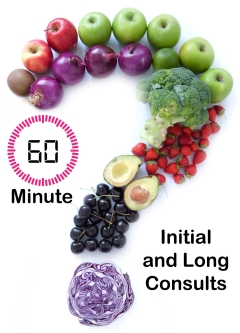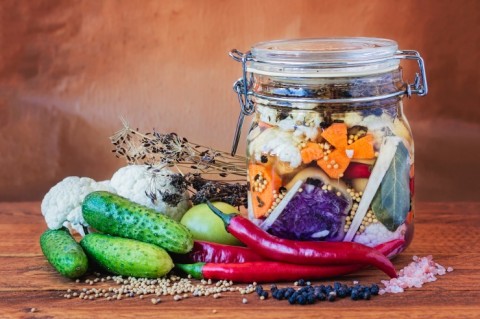DrCarney.com Blog
Lacto-Fermented Foods Linked to Esophageal Cancer
Did our ancestors have wisdom that we can recover to help us with our modern health problems? Both the Weston A. Price Foundation and the promoters of Paleolithic diets claim this is the case. They suggest that the deficit of lacto-fermented foods in the modern Western diet deprives us of beneficial gut bacteria thus making us susceptible to viruses and other illnesses. The reasoning is not only intriguing, but very appealing. What does science say about lacto-fermented foods?
Reviewing the Research
A 2009 meta-analysis examined 34 English and Chinese language studies conducted to examine the connection between lacto-fermented foods and cancer of the esophagus. After reviewing the evidence, the researchers determined that there was double the risk of esophageal squamous cell carcinoma associated with eating lacto-fermented foods.
Asia is one of the areas of the world where lacto-fermentation, also called “pickling,” has been practiced for centuries and where that ancient practice continues today. In China during the 1960s, cancer registries began to be kept which showed an unusually high incidence of esophageal cancer in certain provinces. Even after controlling for smoking and alcohol, the cancer rate was significantly high. Scientists began studying the common use of foods preserved by this method as the cause for the elevated cancer statistics. In these areas of China, families eat pickled foods daily for 9-12 months out of the year. For some families, these foods form an integral part of the diet.
The Pickling Process
Chinese pickled vegetables are generally made by tightly packing salted vegetables into a jar, allowing them to ferment, and storing them for weeks or months. This process is named for the Lactobacillus strain of bacteria which was first studied in fermented milk. These bacteria convert lactose or other sugars into lactic acid, although lacto-fermentation does not require the use of dairy products. This preservation process relies on fermentation along with the growth of fungi and yeasts and can potentially produce carcinogenic N-nitroso compounds and mycotoxins. It has also been shown in some studies to produce pickles that have mutagenic and carcinogenic microorganisms. In 1993, the World Health Organization added Asian-style pickles to its list of possible carcinogens.
Traditional Diets Value Fruits and Vegetables
So, do traditional people groups have wisdom we need to reclaim? Absolutely! But in looking at how they processed food in bygone eras, maybe we’ve missed the obvious. What were they preserving? Fruits and vegetables! When people live without refrigeration, they do what they can to ensure adequate nutrition for the months when fresh foods aren't available. That is not the current condition in the Western world where we benefit from refrigeration. Although we enjoy access to fresh produce year round, we often suffer with health problems because we choose to eat a diet rich in meat, eggs, dairy products, and processed foods--a diet very different from the foods eaten by the average person centuries ago.
Dr. John McDougall points out that our modern diet resembles the indulgent diet of ancient royalty, and we suffer from the same diseases ancient royalty died from. The majority of the populace from centuries past thrived on a diet that was based on vegetables, legumes, fruit, and grains--not based on animal products. Today, when we adopt a diet resembling the foods that have preserved civilizations for centuries, we too can enjoy improved health. A low fat, whole-foods plant-based diet without added oil has been shown to prevent, stop, and often reverse diseases like obesity, cardiovascular disease, diabetes, hypertension, arthritis, and cancer--all without the risks posed by pickling our foods.
Do you have science to share regarding lacto-fermented foods?
Join the discussion at our discussion forum to share your views.
Since this blog first posted, we have received the following helpful links from our readers:
(1) How Sauerkraut Gives You Stomach Cancer (Fermented and Pickled Foods)
(2) Fermented Foods: Intake and Implications for Cancer Risk
Here is additional research on the link between lacto-fermenting and cancer:
(3) Vegetables, but not pickled vegetables, are negatively associated with the risk of breast cancer.
For further information, you might like to read:
(1) Phytic Acid in Grains? No Problem!
(2) The Paleo Diet is Uncivilized
(3) Dr. Michael Greger Reviews the Paleo Diet
Scroll Down Page to Leave Comments

Got Questions?
We would love to receive your questions. Join in the Starch-Smart Discussions on DrCarney.com by signing up for a free membership to the Dr. Carney Community.
One Hour Phone Consult with Dr. Carney

Telephone Food Coaching Sessions with Linda Carney MD
Due to demand for nutritional advice, Dr. Carney's offers Starch-Smart® System "Dietary Care Extraordinaire" Food Coaching telephone sessions. The first sessions is always one hour. Subsequent sessions can be thirty minutes or one hour:
Click Here For 60 Minute Food Coaching Session
Please Note: Food Coaching sessions are not medical appointments and are not intended to replace your own physician. No tests will be ordered and no prescriptions will be provided.
When you subscribe to the blog, we will send you an e-mail when there are new updates on the site so you wouldn't miss them.




